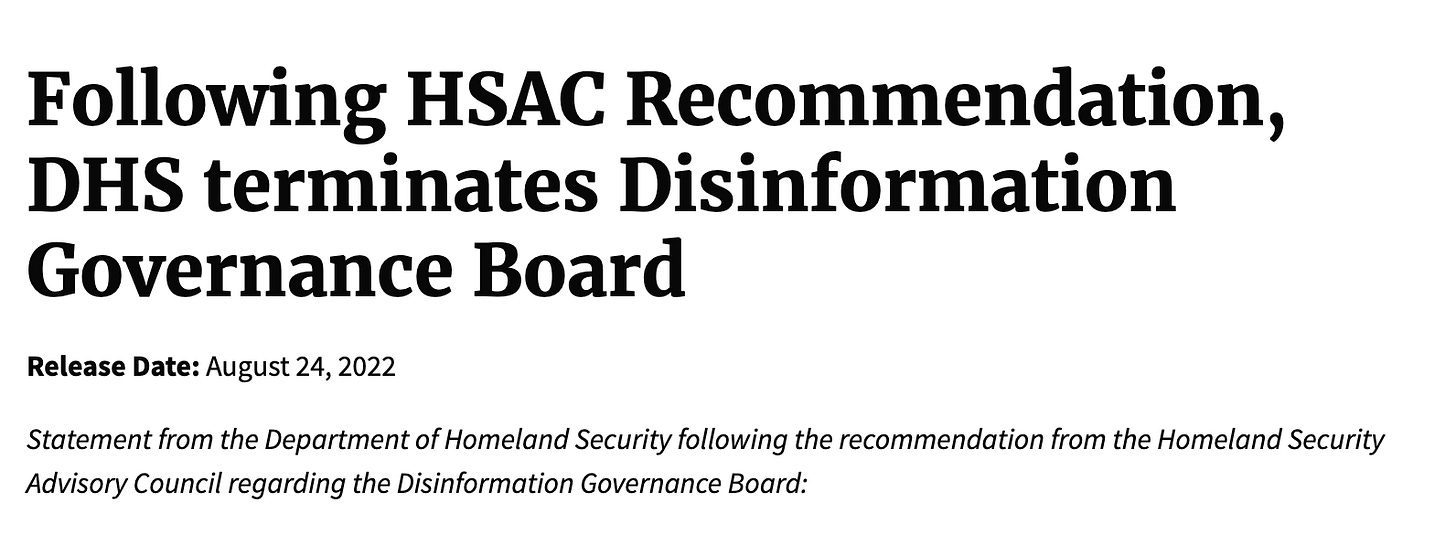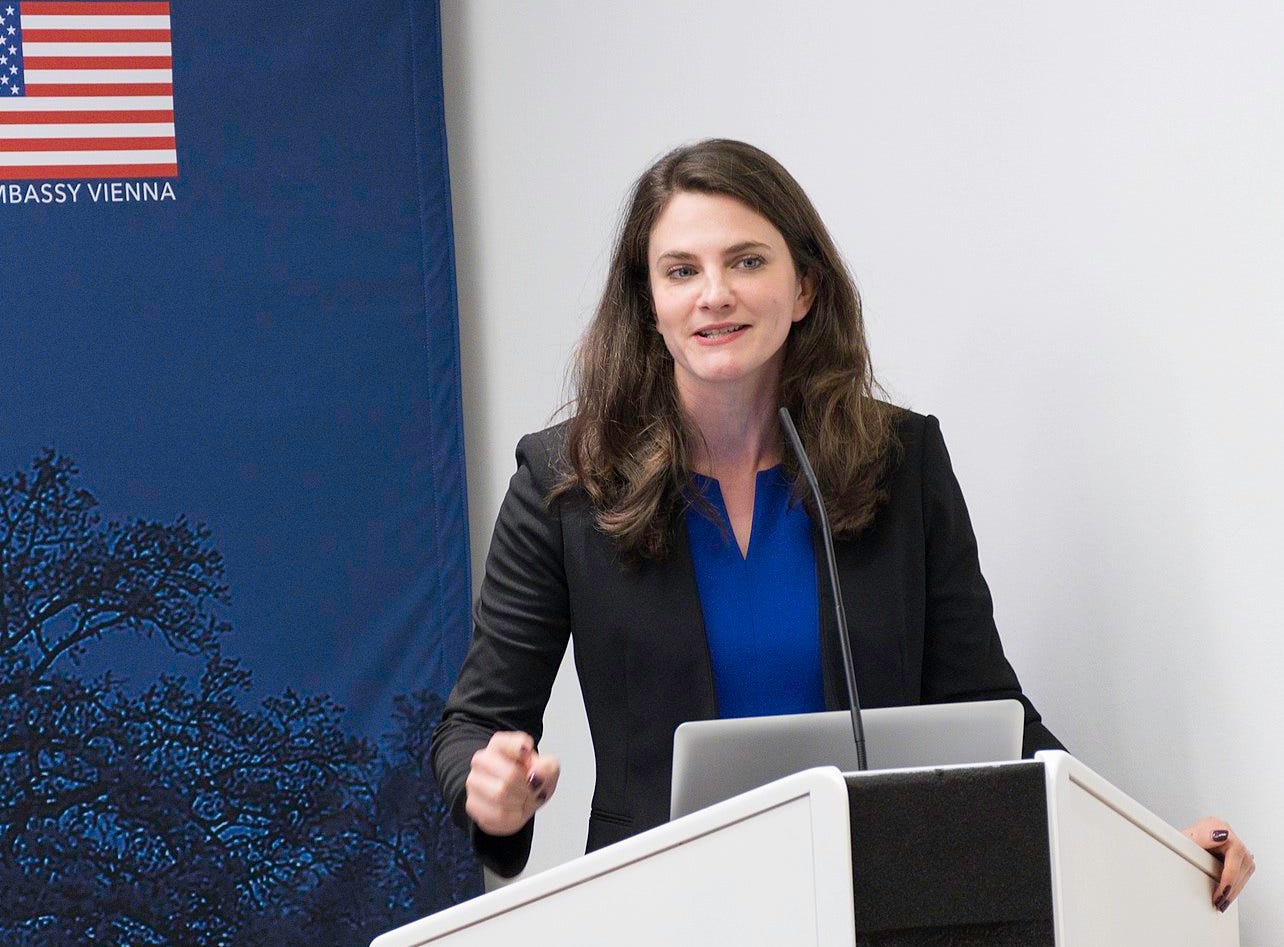Scrutinizing the Disinformation Board and Jankowicz Wasn't Disinformation and Still Isn't
The Disinformation Governance Board's former head says it's disinformation (and abetting harassment!) to point out her disinformation, and the press is happy to misinformation you about it all.
Nina Jankowicz is back in the news to tell all of us that Nina Jankowicz should not be in the news and, with the help of the news media, to inform us any criticism of Nina Jankowicz is disinformation and tantamount to harassment and abuse.
It’s been almost a year since the ill-fated creation of the now-defunct Disinformation Governance Board, which Jankowicz was to head. It happened the same week of a Securities Exchange Commission filing showed Elon Musk buying Twitter. The two happening in tandem offered a lesson in which threats to Americans’ rights to speech the mainstream press deems problematic.
In short, perceived threats from the government are not nearly as big a deal as perceived threats from private citizens who have views divergent from the press corps. Musk was a villain. Jankowicz and the crack team who decided to create a Disinformation Governance Board, and name it the Disinformation Governance Board, inside the Department of Homeland Security were misunderstood intellectuals and unfairly maligned public servants.
I was reminded of this dynamic this week, as Rep. Jim Jordan (R-Ohio) announced he’s subpoenaing Jancowicz as part of oversight work in the Select Subcommittee on the Weaponization of Government newly formed by the Republican majority in the House. One of the things Republicans would like to oversee is why and how the federal government decided to create a Disinformation Governance Board, and put a think-tank employee, about whom DHS Sec. Alejandro Mayorkas knew almost nothing, in charge of it.
Headlined “‘A surreal experience’: Former Biden ‘disinfo’ chief details harassment,” this Politico piece is not about exploring the origins of the bad idea of creating a Disinformation Governance Board inside the federal government, which had even the mild-mannered Sen. Mitt Romney veritably spitting his disapproval. Instead, it is an exercise in conflating criticism and harassment of a public figure—Jankowicz, who also happened to be pregnant and postpartum while she was in the limelight— to discredit any criticism of her and her mission.
Let us first stipulate that Jankowicz should absolutely not have to endure harassment or seek restraining orders as a cost of being a public figure. Jankowicz has written in her book, “How to be a Woman Online” about the disproportionate amount of abuse women in the public eye get online. Been there. I’ve had three weirdos look for me and threaten me over the course of my career and countless trolls offer up dead-husband jokes and judgments on the current disposition of my teeth, weight, make-up, and soul. I’ve been pregnant or postpartum for roughly four years of that career. I wish Jankowicz the absolute best with her growing family.
Let’s also stipulate that all of that makes neither Jankowicz nor me off-limits for criticism. To pretend all criticism amounts to harassment or induces harassment is a disservice to public discourse and an attempt to shut people up. Which is, frankly, exactly what critics were afraid Jankowicz’s mission would be. With good reason!
The first clue was that she took a position inside the federal government as head of a Disinformation Governance Board and thought that was a super idea that would upset no one.
But let’s get more specific, as there are plenty of people in the mainstream press who did not consider it a bad idea to form such a board inside the federal government. They transcribed the federal government’s insistence that “ackshually, this internal board will have no power over regular citizens’ speech and is in fact designed to protect free speech!” with great credulity.
Republican leaders and commentators talked about it as an Orwellian Ministry of Truth that would police people’s speech.
That was never the board’s mandate, a department spokesman said in a written statement. Instead, it was meant to coordinate the department’s various agencies in the fight against malicious disinformation by foreign adversaries, drug or human traffickers or other international crime groups.
The NYT was nice enough to give the government more credit than Mayorkas himself did, slobbering that the plan for the board “could not have been clearer.” This despite evidence the board planned to form partnerships with social media companies of the kind that later reporting in the Twitter Files and the Intercept shows does interfere with the speech of American citizens.
Three weeks after its announcement, the nascent Disinformation Governance Board’s work was paused and Jankowicz resigned. Coverage remained of the “Republicans pounce” variety, bemoaning that the Disinformation Governance Board had been felled by a “disinformation campaign” to besmirch the honor and good intentions of the Disinformation Governance Board!
New York Times: A Panel to Combat Disinformation Becomes a Victim of It
Washington Post: How the Biden Administration Let Right-Wing Attacks Derail its Disinformation Efforts
NPR: She joined DHS to fight disinformation. She says she was halted by... disinformation
After the pause, some high-profile veterans of very good federal government ideas, Michael Chertoff and Jamie Gorelick, were tasked with spending many months deciding whether the formation of Disinformation Governance Board was as good idea after all. Turns out it wasn’t. I wonder how much that cost to figure out.

One of my favorite moments from this whole saga was Mayorkas saying the reason we need the Disinformation Governance Board is because the federal government has already been doing disinformation work that could interfere with speech and the federal government needs to protect us from the federal government!
"What this working group seeks to actually do is develop guidelines, standards, and guardrails to ensure that the work that has been ongoing for nearly 10 years does not infringe on people's free speech rights, rights of privacy, civil rights and civil liberties," Mayorkas said. "It was quite disconcerting, frankly, that the disinformation work that was well underway for many years, across different independent administrations was not guided by guardrails."
Oh, well then, this board that even Jankowicz conceded boasts a creepy name and no transparency sounds like a great idea.
“I definitely think that the information vacuum that we created allowed people to fill in the blanks. It frankly showed exactly how disinformation campaigns work,” she told NPR in the wake of her resignation.
She described unacceptable threats and personal attacks against her, then added that “people who are spreading… childish characterizations of me and my work encourage this type of behavior online, whether or not they say those words themselves.”
The head of the proposed Disinformation Governance Board believes that criticism of the murky intentions of a Disinformation Governance Board is just disinformation and that people making fun of her Mary Poppins TikTok are abetting criminal death threats. This seems fine.
One of the complaints put forth in the Politico article is that too much of the criticism focused on Jankowizc herself. Jankowicz argues she and her statements as a private citizen should have been off-limits as she took on this public role, even though her statements were made publicly in her capacity as a disinformation expert.
But there wasn’t much else to judge the Disinformation Governance Board on other than its name and its leader. As CBS reported:
But DHS has yet to release a charter for the board, and there's still some confusion about the parameters for the group. Officials released a fact sheet, Monday, which promises to "release comprehensive quarterly reports about the working group's activities to Congress, including its oversight committees."
The Washington Post’s Taylor Lorenz noted the same fact sheet, “did nothing to quell the outrage that had been building on the Internet, nor did it clarify much of what the board would actually be doing or Jankowicz’s role in it.”
It seems like a Disinformation Governance Board with little transparency and hazy intentions would spark quite a bit of worry in the press corps, but no. Instead, it was mostly free-speech advocates and critics who looked to Jankowizc’s disposition on disinformation and free speech for indications. What they found wasn’t great, but Politico insists a year later that taking aim at Jankowicz’s tweets was problematic.
One tweet casting doubt on the provenance of Hunter Biden’s laptop “went viral without the context that it was her live tweeting an Oct. 20 presidential debate,” you see.
What Politico doesn’t mention is Jankowicz also cast doubt on the provenance of the Hunter Biden laptop to the Associated Press, chiming in on this news cycle as a disinformation expert with some… disinformation.
“We should view it as a Trump campaign product,” she told the Associated Press in October of 2020. That same day, she tweeted the story was a “fairy tale about a laptop repair shop.”
In the aforementioned “How to Be a Woman Online,” published in April 2022, Jankowizc puts free speech in scare quotes when she references those who worry about legal punishment for online misbehavior.
In another NPR interview, Jankowicz was asked about Musk’s purchase of Twitter and she waxed poetic about the UK’s policing of speech it deems harmful:
And I shudder to think about if free speech absolutists were taking over more platforms, what that would look like for the marginalized communities all around the world, which are already shouldering so much of this abuse, disproportionate amounts of this abuse, and retraumatizing themselves as they try to protect themselves from it, you know, reporting, blocking, et cetera. We need the platforms to do more, and we frankly need law enforcement and our legislatures to do more as well. And in other countries that are looking at this, you know, the U.K. has an online safety bill that's being considered right now where they're trying to make illegal this currently, quote, "awful but lawful content" that exists online where people are being harassed.
One of the proposed provisions of this online safety bill would ban videos of migrants arriving in Britain posted “in a positive light,” just for an idea of how friendly to free-speech rights this push is.
A year earlier, she advocated for adding provisions about online harassment to the Violence Against Women Act, spurred by research she did at the Wilson Center on online abuse of women. The report she authored studied tweets sent to 13 female politicians, domestic and international. Only five of the studied group were right-of-center. The research defined “disinformation” as “involv[ing] the spreading of rumors or alleged ‘facts,’ often of a sexual nature, in order to humiliate, discredit, or disempower the subjects,” which is a somewhat broader purview than DHS would have you believe its board was to have.
From beginning to end, this affair shows why putting government entities in charge of what is “disinformation” and what’s not is a slippery and dangerous prospect. Throughout, “disinformation” is whatever Jankowicz and her allies deem a problem, which is exactly the problem her critics were right to point out. I’m pretty sure Jankowicz sincerely believes her judgment is good enough to referee debates without downsides.
But that is not how free speech works in this country, where yes, untrue or hurtful things are allowed without government agencies deciding which speech is worthy. It’s one thing for Jankowicz to dismiss this fundamental freedom— a quintessential example of Matt Taibbi’s “hall-monitor personality… [who] came to view civil liberties themselves as the root cause of America’s political problems.” That the press so often helps her in this endeavor is embarrassing.




